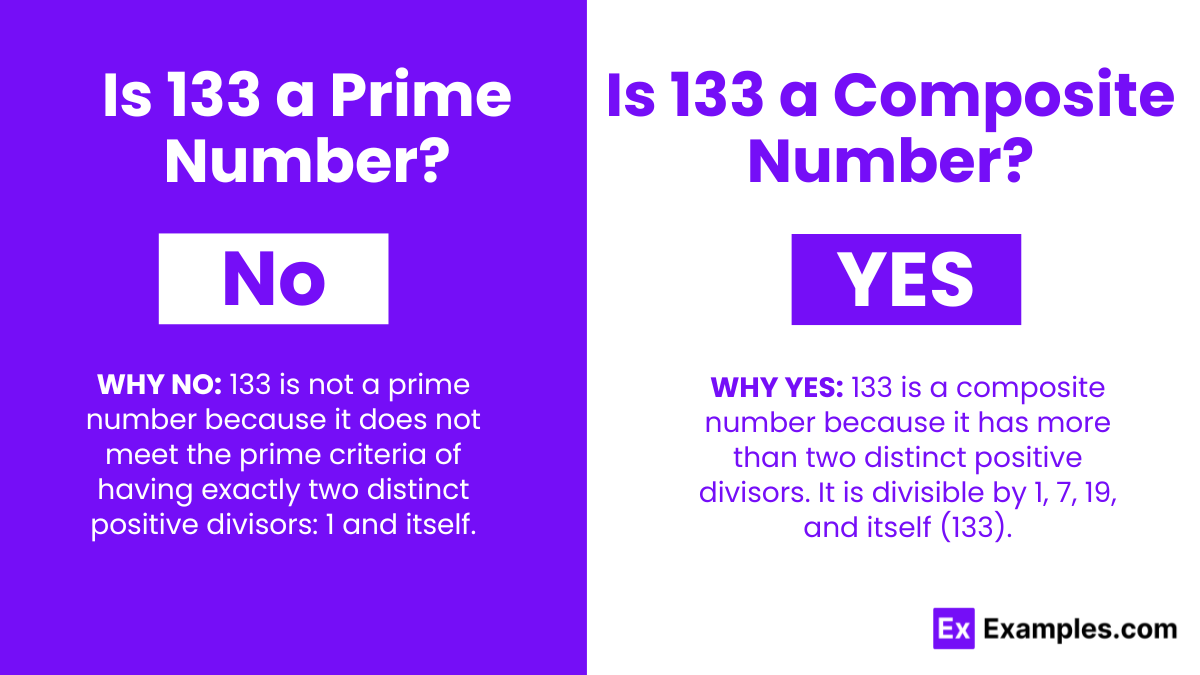Is 133 a prime number or a composite number?
Prime
Composite
Neither
Both

Why No: 133 is not a prime number because it does not meet the prime criteria of having exactly two distinct positive divisors: 1 and itself. Check if any number is prime or not.
Why Yes: 133 is a composite number because it has more than two distinct positive divisors. It is divisible by 1, 7, 19, and itself (133).
| Property | Answer |
|---|---|
| Is 133 a prime number? | No |
| Is 133 a composite number? | Yes |
| Is 133 a perfect square? | No |
| Factors of 133 | 1, 7, 19, 133 |
| Multiples of 133 | 133, 266, 399, 532, 665, 798, 931, 1064, 1197, 1330 |
| Cube Root of 133 | Approximately 5.093 |
| Square of 133 | 17689 |
| Square Root of 133 | Approximately 11.532 |
| Is 133 a Perfect Cube? | No |
| Is 133 an Irrational number | No |
| Is 133 a Rational number | Yes |
| Is 133 a Real number | Yes |
| Is 133 an Integer | Yes |
| Is 133 a Natural number | Yes |
| Is 133 a Whole number | Yes |
| Is 133 an Even or odd number | Odd (133 is an odd number) |
| Is 133 an Ordinal number | Yes |
| Is 133 a Complex number | Yes (as all real numbers are also complex numbers) |
The factors of 133 are 1, 7, 19, and 133. 133 is not a prime number because it is divisible by numbers other than 1 and itself, demonstrating it has more than two factors. This clarity confirms that it is a composite number, not a prime number.
133 is categorized as a composite number because it has more than two distinct positive divisors: 1, 7, 19, and itself.
The nearest prime numbers to 133 are 131 and 137. 131 is the closest prime number less than 133, and 137 is the closest prime number greater than 133.
Text prompt
Add Tone
10 Examples of Public speaking
20 Examples of Gas lighting
Is 133 a prime number or a composite number?
Prime
Composite
Neither
Both
Which of the following numbers divides 133 evenly?
5
7
11
13
Find the factors of 133.
1, 133
1, 7, 19, 133
1, 2, 133
1, 3, 133
What is the result of dividing 133 by 19?
6
7
8
9
Determine if 133 is divisible by 2.
Yes
No
Only when even
Only when odd
If a number is divisible by both 7 and 19, is it prime or composite?
Prime
Composite
Neither
Both
Which of these methods can verify if 133 is a prime number?
Check divisibility by small primes
Add digits of the number
Find the square root
Count the digits
How many prime factors does 133 have?
1
2
3
4
What is 133 divided by 7?
18
19
20
21
Is 133 a prime number when tested against 11?
Yes
No
Only if the remainder is 0
Only if divisible by 2
Before you leave, take our quick quiz to enhance your learning!

